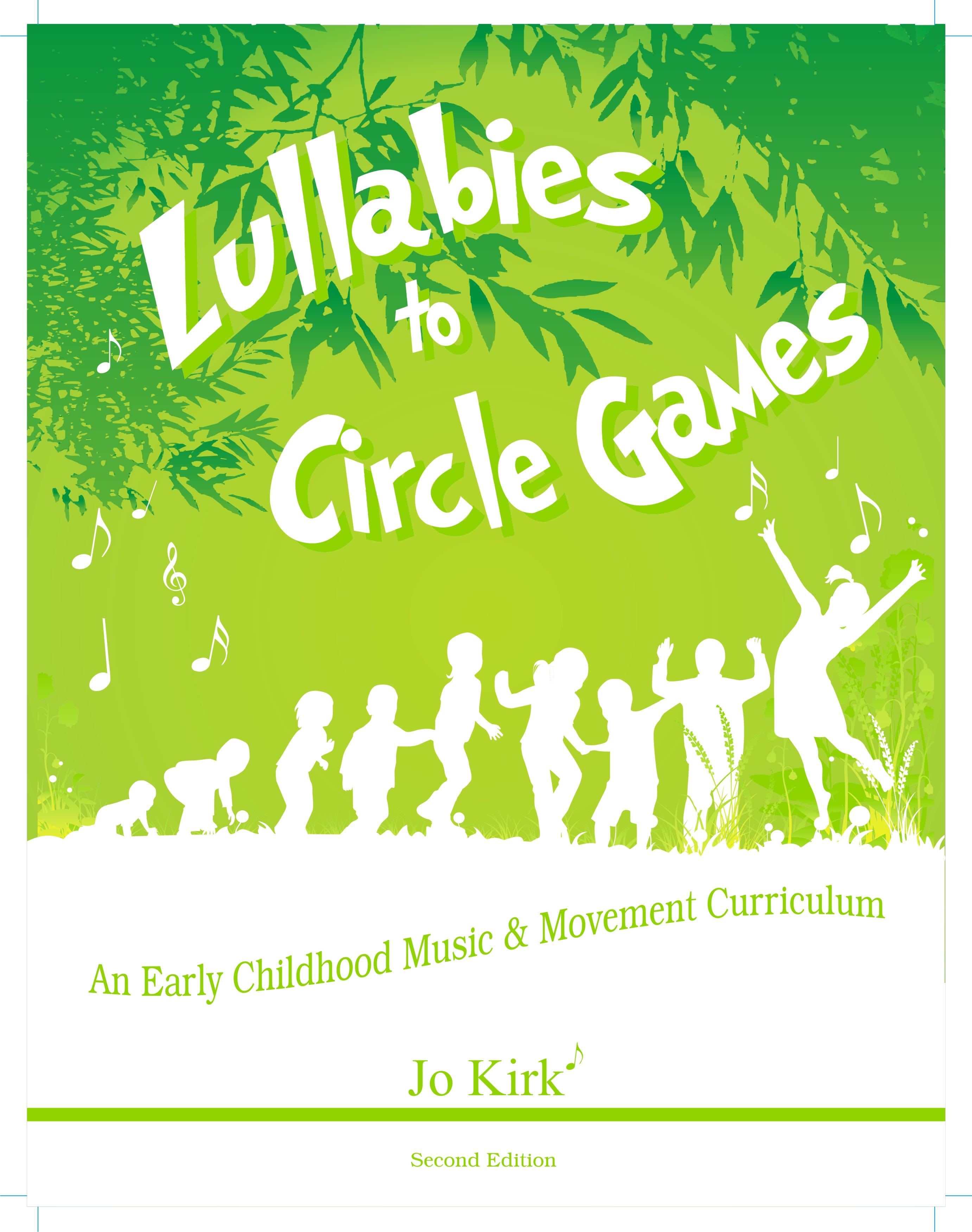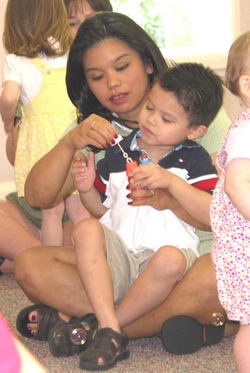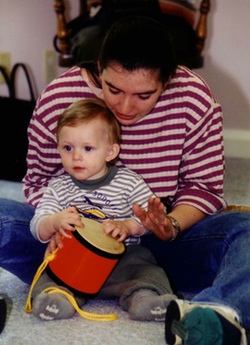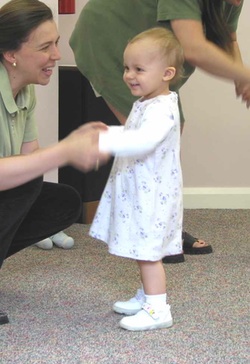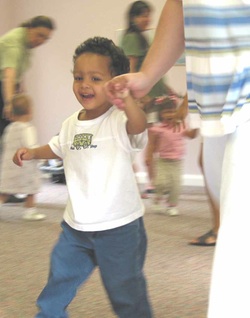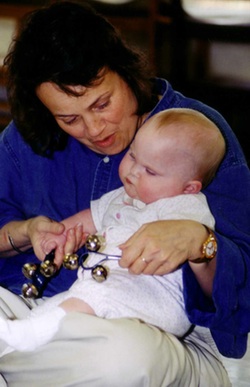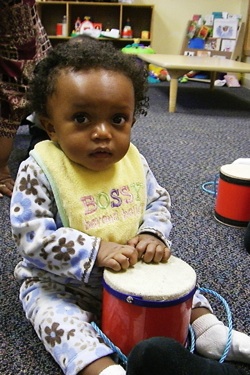MUSIC a "SUPER FOOD!"
/Have you even noticed how children, even infants, are automatically drawn to music? They instantly respond with energetic movement, dance, and even join in song! Why is this? The answer: music is activating both the left and right hemispheres of your child’s brain. Research indicates that we are not only left or right brain thinkers, but both sides of our brains need to be engaged at the same time to create the best outcomes. Music not only hold words, a left-brain concept, but also rhythm and melody which are right brain concepts. VOILÁ!! MUSIC is a SUPER FOOD!! When your child responds to music, she is busy thinking, moving, playing and LEARNING through this joy-filled musical experiences!
Music is a “Super Food” way to live, love and learn because it holds the powerful element of PLAY. Active music making feels and looks like play to you child. She will stay at a music activity longer because it feels like play. I mean, how many times have you heard “Sing it again Mommy!” or “More Mommy More!!” Joyful music play causes the child to thirst for MORE therefore, essential early skills are being developed through this joyful musical play. Play is the child’s “work.” It is how she learns.
MUSIC – “5 SUPER FOOD” BENEFITS
Did you know that we are not born with “skills?” Skills are taught, modeled and learned. And guess who is the most important “skill teacher” in your child life? YOU!! And, the home is your child’s most important learning environment. So, HELP! How can we as parents and caregivers teach, model and guide our children to master essential developmental skills using music? Let’s consider these
1. Listening Skills
“Listening is the most important skill our children need to be successful in school. Children are coming to school without this skill,” states E. Cunningham Ph. D in her book Book Smart: How to Support and Develop a Motivated and Successful Reader. My first reaction to this statement was, “Oh My! This is rather disturbing! What are we going to do? Answer: Give our children MUSIC a “Super Food.” But, you ask, “How is music going to teach my child how to listen?” Glad you asked! Answer: Music is First a Listening Art!! Music holds the wonderful element of PLAY that causes the child to thirst to listen. The music ‘begs” the child to listen because he wants to play the games, sing the song and be a part of the fun. The child must listen to do this. He must listen to sing, move, play, and relate to others.
What to do at home? Add the “Super Food” of Music to everything you do at home. Build your song and music repertoire by participating in a Parent/Child music class in your community. Go to your public library and check out high quality children’s literature that is based on Song. Instead of reading the book, SING the book!! Sing songs you remember from your childhood. Make-up your own songs. Sing about putting toys away, making dinner, going to bed, counting stairs up and down. Put on some good music and dance or play rhythm instruments with your child.
2. Language, Reading & Math Skills
We just learned that singing games, dancing, and playing rhythm instruments, help to develop listening skills and auditory discrimination (the ability to hear differences in sounds) But, did you know that these skills are necessary tools in developing speech, reading and spelling skills. Many pre-reading skills are part of music: rhyme, sequencing, patterning, word rhythm, prosody, vocabulary, meter and eye-hand coordination, to mention a few. (Coburn)
Learning how to speak, read and write are not simple or easy tasks!! But, MUSIC can be a “Super Food” that nurtures these skills for your child. Studies at Northwestern University found that the following five skills trigger language acquisition: “phonological awareness, speech-in-noise perception, rhythm perception, auditory working memory and the ability to learn sound patterns. Their research revealed that children who received music training along with reading training performed much better than those who received other forms of non-musical stimulation, such as painting or other visual arts. Each of the 5 skills were exercised and strengthened by music!!!
A study in Germany found that “music improves cognitive and non-cognitive skills more than twice as much as sports, theater or dance.” The study also found that students who take music lessons “have better cognitive skills, better school grades and are more conscientious, open and ambitious. WOW! I find this amazing!! (German Socio-Economic Panel)
Here's another mind-boggling fact! When a child actively participates in music, 90% of the brain is being used and developed. When the child sings, all 8 “centers” of the brain work simultaneously. These types of experiences build connections in the brain, which can later be used for math, reading, science, sports, and music. (Coburn)
What to do at home? Sing the Alphabet Song and songs that teach letter sounds. (Ask your preschool teachers…they’ll have a list!!!) Teach your child finger plays because the finger motions correspond with the words being spoken! Play rhythm instruments. Begin by tapping the steady beat (the heart-beat of the song) then progress to playing the rhythm (“the way the words go.”) Sing traditional folk songs and nursery rhymes with your child because the words of the “folk songs” follow the rhythmic patterns of our spoken language. Teach your little one tongue twisters and enjoy the laughter!!!
3. Social Skills
Want to help your children become more sociable and friendlier? Give them Music a “Super Food!” Research conducted by the University of Miami found that children in preschool settings become friendlier and more sociable when musical activities are a part of their daily routine, as opposed to schools where it is not. (Coburn)
What to do at home? Instead of “telling” your child to “put your books away,” SING “Books away, books away. Time to put your books away!” Did you know that children listen better if we sing instead of talk! Amazing!! I remember my own stressful Mommy days and how the joy of music and singing turned our day around, from stress and gloom to calm and giggles. Enroll in a Parent/Child Music Class where your child will be surrounded by other children. You will find that “something special happens between people who share music together!” Life long bonds are formed between not only the children but also the parents! Empathy, emotions and social interaction are modeled and learned in this play-filled musical environment! Music is meant to be shared with others!! Making music together is a social event!! Music is a “Super Food” towards social development!
4. Movement Skills
The child’s most favorite response to music is to move. In early childhood music IS movement. They go “hand in hand!” Music combined with movement helps the child develop gross motor skills, coordination, balance and spatial awareness. Can you believe that 50% more of a learning experience is retained when a movement is added to the instruction? (Coburn) Well, just think… How did we learn “The Ensey Wensey Spider?”…with MOVEMENT!! Movement helps to make the learning experience more concrete for the child. What a great “Super Food!!!”
Marching to and keeping the steady beat is not only for the marching band! It’s for “readers” too! Keep the beat help me be a better reader? Yep! That’s what I said! Northwestern University studies suggests that “moving in time to a steady beat is closely linked to better language skills. “We know that moving to a steady beat is a fundamental skill not only for music performance but one that has been linked to language and reading skills,” states Dr. Nina Krause.
What to do at home? Clap your hands, stomp your feet, tap your head, wave your arms, tap your foot, nod your head, jump up high, twist side to side as you sing some of your child’s favorite songs. Get out your pots and pans and make a “kitchen band!” Put on some fast-paced marching music and march around the house playing your “kitchen drum!!” Purchase high quality rhythm instruments for your child to explore. Encourage the child to tap “big big big big” on his instrument while the music plays or as you sing together!! Clap the steady beat while you say nursery rhymes or tongue twisters.
5. Self-Control & Regulation Skills
Musical activities help children learn to tell their bodies what to do, when to stop, when to go, and even when to clean up. If the child is moving with the music and the music stops, the child will often STOP more readily than without music. (Coburn)
Music is a “Super Food!” It energizes us. It calms us. It can make us happy or sad. It triggers the brain to learn and it helps us deal with the world around us. Coulter states, “Being actively involved with good music is healthy for us on every level: mentally, emotionally, physically, and spiritually. (Coulter)
What to do at home? Find a variety of musical recording that helps to calm, energize and center your child. Play these recordings when “the time is right!” Snuggle with your little one or rock him while filling the room with calm soothing music. Better yet, start singing your favorite lullabies or cherished songs from your childhood. Every night after prayers, my Mom would sing to my twin sister and me, “I love you a bushel and a peck, a bushel and a peck and a hug around the neck!....” Those moments are still near and dear to my heart and those memories are ages ago. Humm, must be the the power of Music a “Super Food!!”
Mrs. Jo’s Favorite Books for “Super Food” Music!
Both of these publications come with a delightful CD so you can learn the music along with your child!! Trust me! You’ll be humming many of these songs before you know it!!
May your parenting be filled with joy and music as you share, explore and integrated “Music, a “Super Food” into your child’s daily diet.
“Sing”cerely,
Jo Kirk, President
WeJoySing, Inc
SHARE this article with a friend and LEAVE A COMMENT about HOW this article WAS HELPFUL for you at http://www.wejoysing.com/contact/ or on our Facebook page and receive $5.00 off WeJoySing enrollment.












